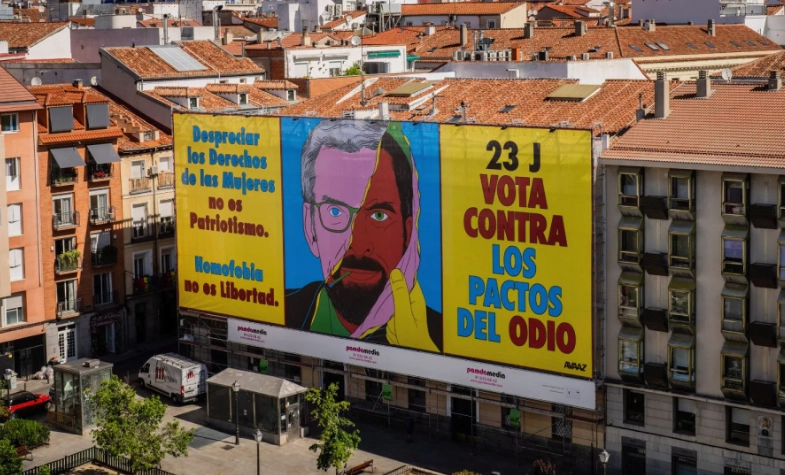This year will be marked by 76 electoral processes worldwide, the largest number in the short history of modern democracy. But it is only the beginning, as it is expected that in the next two years, almost three billion people will vote in countries such as Mexico, India, Indonesia, Brazil, and the United States.
Political platforms will resort to all kinds of strategies to win the vote, news about the elections will grab the attention of the media and analysts will be attentive to comment, predict, and explain winners and losers.
Although perhaps not the central component of democracy, elections have been understood as the hallmark of that form of government. In fact, in recent times, electoral triumphs have been read, both by politicians and analysts of all spectrums, as the quintessence of the popular will.
However, a worrisome digital threat looms over that accumulation of electoral processes: the social polarization generated by disinformation, the consequences of which are not yet clear to us.
We know this: the World Economic Forum’s Global Risk Perception Survey 2023-2024 (GRPS) shows that people expect a turbulent future. In 10 years, the most mentioned risk was climate change and its social consequences. But for the next two years, the most immediate perceived risk is misinformation.
Intensified by digital tools and artificial intelligence, disinformation can be understood as a deliberate and persistent dissemination of false, manipulated, fabricated, and imposter content through traditional and digital media.
Were it not for the potential of synthetic media to distribute uncontrollably this content, perhaps disinformation and its variants would be just another chapter in the history of gossip. But its risks are in our hands, and we must ask ourselves how it could affect, in the short term, the electoral processes at hand and, in the long term, democracy. Let’s see.
In addition to the use of digital technologies and artificial intelligence, another factor boosts the risks of disinformation: politicians use it to create an environment of social polarization. It is no coincidence that the GRPS places social and political polarization in third place among the perceived risks in the short term.
In this sense, the first risk posed by the dynamics of disinformation for the electoral framework is that political actors take advantage of digital tools to increase the rejection of their adversaries, generating a climate of daily distrust toward the other. What the politicians who are already using these polarization dynamics have not calculated is that the social fracture they are creating could lead us to an all-or-nothing result. Therefore, the vote would not be for the support or rejection of a political platform, but to silence those voices with which we differ.
While the origin of our current polarization lies in discourses that exclude diversity, it is time to invert our perspective and begin to think of political polarization as a phenomenon that in itself is eroding democratic society daily, as disinformation feeds on its viral dissemination, but above all on its personalization. Trapped in digital bubbles increasingly impervious to diversity of opinion, divisive messages from politicians trying to get out the vote at all costs will reach specific groups reinforcing their opinions and widening the political and social divide between people in their daily lives.
At what point will we begin to see extreme scenarios of violence or radicalization provoked by the dissemination of a video or audio generated to influence not only the vote but also the stigmatization of the political adversary? This would be the second risk of disinformation in electoral times.
The risks are not limited to the pair I have mentioned, but moving toward the long term, disinformation can undermine the foundations of democracy in at least two possible scenarios.
First, faced with the impossibility of controlling disinformation, governments may be tempted to close communication channels to exert an iron grip on content and, consequently, control messages, and interpretations and construct their own “truth”. Although there is no shortage of examples of existing governments, it is worth returning to George Orwell’s novel “1984” to reflect on this situation.
The second risk, perhaps more worrying, is that disinformation can generate a state of discontent among voters that leads them to distrust the legitimacy of the newly elected government. Among fake news, hoaxes, and disqualifications, the belief that the winner is a person who is either immoral or illegal, and therefore cannot govern, may become more and more prevalent.
The symbiosis between disinformation and polarization would increase the perception of the illegality of the electoral triumph, eroding not only the trust among citizens but also the democratic processes themselves, since these will not be supported by the number of votes. Still, it will be eclipsed by the perception that has been created through disinformation.
While it is true that the possible marches, riots, or protests that this uncertainty causes are important risks, disinformation, and polarization can alter our perception of the facts because, regardless of what we call it — fake news, deepfakes, post-truth, infodemia, disinformation — mistrust in information is a phenomenon because it produces the same consequence: social polarization based on an emotion that produces certainties and rejects everything different from us.
2024 will be a key year for democracy. The cacophony produced by the electoral maelstrom and the countless terabytes of disinformation could lead us to the easy conclusion that elections are the whole of democracy. But if disinformation is imposed as a perverse legitimization of the electoral triumph, the casting of votes in favor of a political platform would close all opinion and democracy would begin to disappear to give way to disinfocracy.
*Translated by Janaína Ruviaro da Silva from the original in Spanish.













